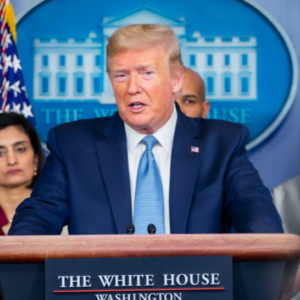Some American were stunned – and angry – when they heard Dr. Anthony Fauci tell Congress that the six-foot social distancing rule that made life so difficult during the pandemic “sort of just appeared” and wasn’t supported by any specific scientific studies.
And many amateur chefs were chagrined with word President Joe Biden’s Department of Energy was proposing rules that could have meant the end of their treasured gas stoves.
In both cases, government agencies imposing these policies say the experts know best. Opponents counter that, as COVID reminded America, the experts aren’t always right. And while scientific and technical expertise is important, policy should be set by elected representatives of the people, not self-declared elites.
This battle has gone public thanks to a Biden administration initiative known as “Trump proofing” – changing bureaucratic rules to try to keep an incoming Republican president from reversing policies put in place by his Democratic predecessor.
Biden administration officials are invoking the premise of “scientific integrity” as they impose bureaucratic roadblocks to oversight by elected officials and their appointees. The White House tapped longtime National Institutes of Health (NIH) administrator Dr. Lyric Jorgenson as its designated scientific integrity officer.
In addition to assigning Jorgenson as the NIH’s watchdog, Politico reports, the White House has directed the CDC and the Food and Drug Administration “to strengthen their scientific integrity plans, both to ensure that research is rigorous, bias-free, transparent and reliable — and that nonpartisan civil servants are making the research decisions.”
But advocates for democratic oversight argue “nonpartisanship” is simply not a realistic goal. As President Barack Obama famously said, “elections have consequences.”
“I don’t think you can avoid politics and political agenda influencing where government money goes to fund research,” Dr. Jeffrey Singer at the Cato Institute told InsideSources.
The Council to Modernize Governance (CMG) sees Biden’s “scientific integrity” policy as a strategy to keep Democratic policies in place long after the administration is gone.
That includes new Environmental Protection Agency (EPA) rules that say “political appointees” can’t interfere or “inappropriately influence” the way that scientific activities or information are put together, proposed, conducted, reviewed, or evaluated. The Department of Health and Human Services adopted similar rules.
Biden’s EPA later announced that “scientific integrity” protections were in its new contract with unionized workers. This allowed EPA workers to complain if bosses or co-workers attempted what it called “inappropriate interference” into scientific work. It also gave the union power to negotiate any changes to the EPA’s Scientific Integrity Policy definitions.
CMG Executive Director Curtis Schube suggested the changes insulated scientists from politics and, therefore, the consequences for their policies. American voters elect people specifically so they can oversee how the unelected bureaucrats spend their money.
These new policies, Schube said, “appear designed to resist both genuine scientific examination and legally appropriate agency supervision.”
Schube wants the federal government to make sure all research and reporting is nonbiased, honest, and transparent. He stressed it’s important to consistently follow the constitutional framework that puts federal workers “under the supervision and direction of the president or his officers.”
While presidents can revoke executive action through another executive action, Schube worried that any future president may have to issue specific orders focused more on agency decision-making.
That could run the risk of lawsuits from groups who oppose those actions.
For example, President Donald Trump created the Schedule F employee classification. Bureaucrats moved to that classification could be fired by the president at will and appoint a predecessor, without going through the civil service process.
The goal is to make government more responsive, but the National Treasury Employees Union sued over Schedule F shortly after Trump created the designation. And Biden revoked the Schedule F executive order soon after taking office.
Russ Vought, who ran Trump’s Office of Management and Budget and dealt directly with the federal bureaucracy, says the reform is needed.
“People need to understand this is not Bill Clinton’s big government,” Vought said in an interview. “It’s not Jimmy Carter big government. It’s a Barack Obama, Joe Biden infused, hybrid, militant, woke, and weaponized government that makes every decision on the basis of climate change extremism and on the basis of woke militancy.”
Schube said the Biden administration has made no secret of its goals. “[They] have openly acknowledged their plans to ‘resist’ a second Trump administration,” he said.





